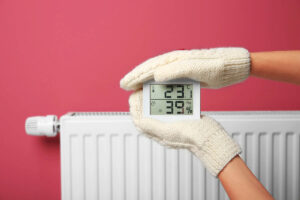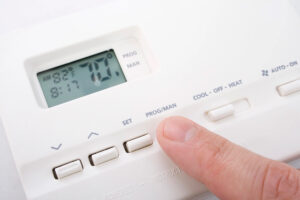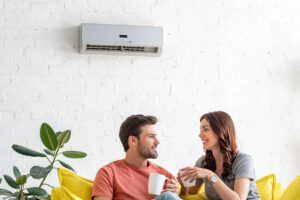Getting a good night’s sleep is essential for overall health and wellbeing. While many factors contribute to sleep quality, one of the most important is the physical environment you sleep in, and whether it’s conducive to deep, restorative sleep.
This begs the question, can your home HVAC help you sleep better? Given the role that your heating and cooling system plays in creating your environment by regulating temperature, humidity and indoor air quality, the answer is assuredly yes.
Let’s take a look at the HVAC system’s impact on your sleep and what you can do to optimize it for better rest.
Temperature: Finding the Sweet Spot
If you’ve wondered how can your home HVAC help you sleep better, temperature control is the primary way. The temperature in your bedroom is essential to a comfortable sleeping environment and a good night’s rest. Fluctuating temperature extremes are a recipe for a restless night.
Sleep studies have shown that the ideal sleeping temperature for most people is between 60°F and 67°F. This range helps facilitate the natural drop in core body temperature that occurs as we prepare for sleep.
To achieve optimal temperature control for better sleep, consider these tips:
- Use a programmable thermostat to lower the temperature before bedtime automatically.
- Consider installing zoned heating and cooling for better sleep, such as a mini-split heat pump, to maintain different temperatures in various parts of your home.
- Use breathable bedding materials to help regulate your body temperature as you sleep.
A consistent, cool temperature can help you fall asleep faster and help you avoid waking up in the middle of the night due to feeling too hot or too cold.
Humidity: Balancing Moisture Levels
Humidity levels can also affect sleep comfort. The ideal indoor relative humidity for sleeping is between 30% and 50%. Too much humidity can make you feel hot and sticky, while too little can lead to dry skin and nose and throat irritation. For best humidity management in your home, try these tactics:
- Use a whole-house humidifier or dehumidifier to maintain optimal levels throughout the home. Small, portable units can be used for individual rooms.
- Monitor indoor humidity with a hygrometer. Inexpensive models can be found at most retail and hardware stores.
- Address any sources of excess moisture, such as leaks or poor ventilation.
Proper humidity management can significantly enhance your sleep quality by creating a more comfortable environment and reducing the risk of allergens like dust mites and mold.
Good Air Quality Makes Breathing Easy
Poor indoor air quality due to airborne pollutants, dust and allergens can affect your sleep by causing eye irritation, itchy skin, dry mouth and throat, coughing, sinus problems and other symptoms, as well as triggering allergies, asthma or other respiratory issues. To improve your indoor air quality for better sleep, you should:
- Regularly change your HVAC filters, ideally every one to three months.
- Consider installing a whole-house air purification system.
- Ensure proper ventilation to reduce indoor pollutants.
Noise Control: Minimizing Disruptions
A noisy HVAC system can be an annoying sleep disturber, especially if you’re a light sleeper. The constant hum and sudden thuds of the starts and stops of your heating and cooling system can disrupt your natural sleep cycles and keep you from entering into a deep, restorative sleep. To cut down on HVAC noise for a better night’s rest, you can:
- Schedule a biannual inspection and routine maintenance to ensure proper operation and reduce any unusual noises.
- Consider upgrading to a newer and quieter system if yours is getting old and cranky.
- Use a white noise or nature sounds generator to help mask the noise from your system.
If you’re routinely roused from your sleep by your heating and cooling equipment, talk to your HVAC contractor about noise reduction in your system.
Consistency Is the Key
Keeping temperature and humidity levels constant throughout the night is very important for maintaining a comfortable sleep environment. When these factors fluctuate, it can cause you to wake up often or shift between sleep stages more frequently, ruining any chance for a restful sleep. To help ensure consistency, you should:
- Avoid large temperature changes just before bedtime.
- Use heavy curtains or blinds to minimize hot or cold air coming in from outside.
- Consider installing a smart thermostat that’s capable of learning your temperature preferences and that adjusts accordingly for nighttime.
The Role of Circadian Rhythms
Your biological internal clock, known as circadian rhythms, is regulated by changes in the environment, including temperature. Slightly cooler temperatures in the evening tell your body that it’s time to sleep as part of your natural sleep-wake cycle. To support your body’s natural rhythms and promote sleep, you should gradually lower the temperature in your home an hour or two before bedtime, and use dimmer lighting at the same time to simulate evening and convince your body that it’s time to get some rest.
Can your home HVAC help you sleep better? Yes it can! Contact Apex Air and let us show you how.



